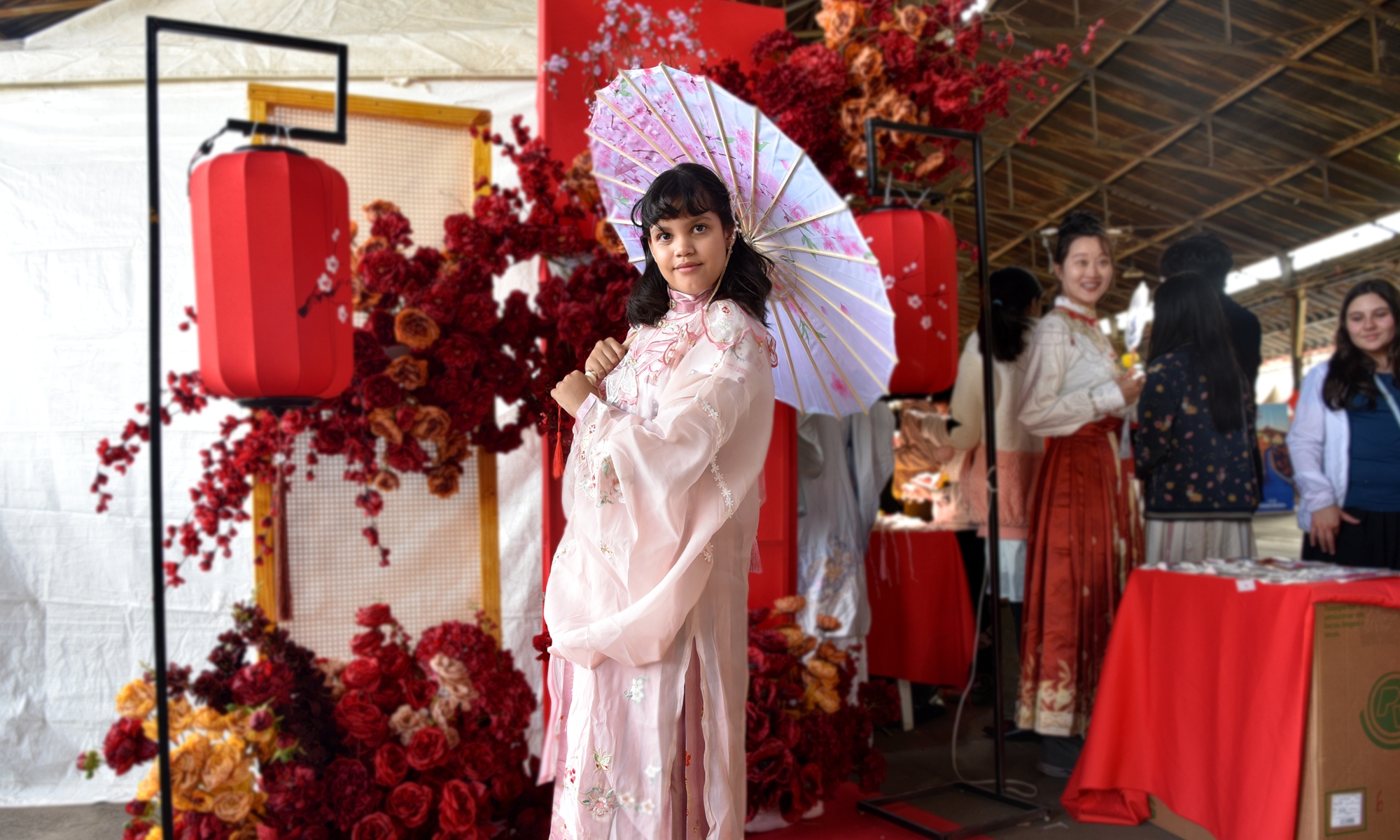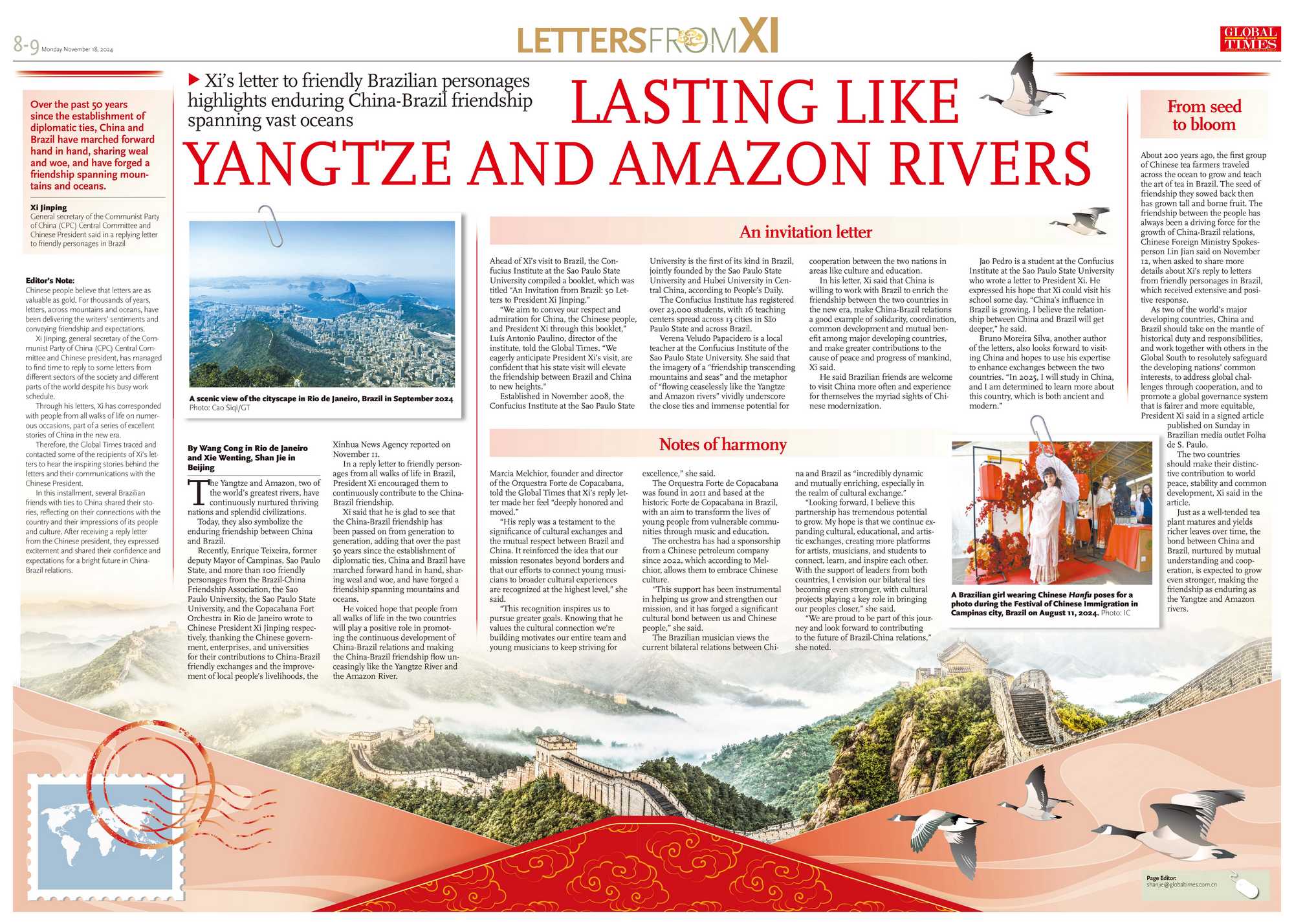
Editor’s note:
Chinese believe that letters are as valuable as gold. For thousands of years, across mountains and oceans, letters have conveyed the feelings of their writers and conveyed friendship and expectations.
Xi Jinping, general secretary of the Central Committee of the Communist Party of China (CPC) and Chinese President, has managed to find time to respond to some letters from different sectors of society and different parts of the world, despite his busy work schedule.
Through his letters, Xi has corresponded with people from all walks of life on numerous occasions, as part of a series of excellent stories about China in the new era.
That’s why the Global Times tracked down and contacted some of the recipients of Xi’s letters to hear the inspiring stories behind the letters and their communications with the Chinese president.
In this episode, several Brazilian friends with ties to China shared their stories, reflecting on their ties to the country and their impressions of its people and culture. After receiving a reply letter from the Chinese President, they expressed their excitement and shared their confidence and expectations for a bright future in China-Brazil relations.

A scenic view of the cityscape in Rio de Janeiro, Brazil in September 2024. Photo: Cao Siqi/GT
The Yangtze and the Amazon, two of the world’s greatest rivers, have continually nourished thriving nations and brilliant civilizations.
Today they also symbolize the enduring friendship between China and Brazil.
Recently, Enrique Teixeira, former deputy mayor of Campinas, Sao Paulo State, and more than a hundred friends from the Brazil-China Friendship Association, Sao Paulo University, Sao Paulo State University and the Copacabana Fort Orchestra in Rio wrote to Janeiro: To Chinese President Xi Jinping respectively, thanking the Chinese government, companies and universities for their contributions to friendly exchanges between China and Brazil and improving the livelihoods of local people, Xinhua News Agency reported on November 11 .
In a reply letter to friends from all walks of life in Brazil, President Xi encouraged them to continuously contribute to the friendship between China and Brazil.
Xi said he is happy to see that the friendship between China and Brazil has been passed down from generation to generation, adding that over the past fifty years since the establishment of diplomatic ties, China and Brazil have moved forward hand in hand and created prosperity and prosperity have shared woe, and forged a friendship that spans mountains and oceans.
He expressed hope that people from all walks of life in the two countries will play a positive role in promoting the continuous development of China-Brazil relations and continuously flowing China-Brazil friendship, as the Yangtze River and the Amazon River.
An invitation letter
Ahead of Xi’s visit to Brazil, the Confucius Institute at Sao Paulo State University compiled a booklet titled “An Invitation from Brazil: 50 Letters to President Xi Jinping.”
“We aim to convey through this booklet our respect and admiration for China, the Chinese people and President Xi,” Luís Antonio Paulino, director of the institute, told the Global Times. “We eagerly await President Xi’s visit and are confident that his state visit will take the friendship between Brazil and China to new heights.”
Established in November 2008, the Confucius Institute at Sao Paulo State University is the first of its kind in Brazil, jointly established by Sao Paulo State University and Hubei University in central China, People’s Daily reported.
The Confucius Institute has registered more than 23,000 students, with 16 educational centers spread across 13 cities in the state of São Paulo and throughout Brazil.
Verena Veludo Papacidero is a local lecturer at the Confucius Institute of Sao Paulo State University. She said the images of a “friendship that transcends mountains and seas” and the metaphor of “flowing ceaselessly like the Yangtze and the Amazon” vividly underline the close ties and enormous potential for cooperation between the two nations in areas such as culture and education .

A Brazilian girl wearing Chinese Hanfu poses for a photo during the Festival of Chinese Immigration in the city of Campinas, Brazil on August 11, 2024. Photo: IC
In his letter, Xi said China is willing to work with Brazil to enrich the friendship between the two countries in the new era and make China-Brazil relations a good example of solidarity, coordination, common development and mutual benefit among the major developing countries. and make greater contributions to the cause of peace and progress of humanity, Xi said.
He said Brazilian friends are welcome to visit China more often and experience for themselves the countless sights of Chinese modernization.
Jao Pedro is a student at the Confucius Institute of Sao Paulo State University and wrote a letter to President Xi. He expressed hope that Xi would one day be able to visit his school. “China’s influence in Brazil is growing. “I believe the relationship between China and Brazil will deepen,” he said.
Bruno Moreira Silva, another author of the letters, is also looking forward to visiting China and hopes to use his expertise to improve exchanges between the two countries. “I will be studying in China in 2025, and I am determined to learn more about this country, which is both ancient and modern.”
Notes of harmony
Marcia Melchior, founder and director of the Orquestra Forte de Copacabana, told the Global Times that Xi’s response letter made her feel “deeply honored and moved.”
“His response was a testament to the importance of cultural exchanges and mutual respect between Brazil and China. It reinforced the idea that our mission resonates across borders and that our efforts to connect young musicians with broader cultural experiences are recognized at the highest level. she said.
“This recognition inspires us to strive for bigger goals. Knowing that he appreciates the cultural connection we are building motivates our entire team and young musicians to continue striving for excellence,” she said.
The Orquestra Forte de Copacabana was founded in 2011 and is based in the historic Forte de Copacabana in Brazil, with the aim of transforming the lives of young people from vulnerable communities through music and education.
The orchestra has had a sponsorship from a Chinese petroleum company since 2022, which Melchior says allows them to embrace Chinese culture.
“This support has helped us grow and strengthen our mission and forged an important cultural bond between us and the Chinese people,” she said.
The Brazilian musician views the current bilateral relations between China and Brazil as “incredibly dynamic and mutually enriching, especially in the field of cultural exchange.”
“Looking to the future, I believe this partnership has tremendous growth potential. I hope we continue to expand cultural, educational and artistic exchanges and create more platforms for artists, musicians and students to connect, learn and share. With the support of leaders from both countries, I foresee our bilateral ties becoming even stronger, with cultural projects playing a key role in bringing our peoples closer together,” she said.
“We are proud to be part of this journey and look forward to contributing to the future of Brazil-China relations,” she noted.
From seed to blossom
About 200 years ago, the first group of Chinese tea farmers traveled across the ocean to grow and teach the art of tea in Brazil. The seed of friendship they sowed then has grown and borne fruit. People’s friendship has always been a driving force for the growth of China-Brazil relations, Chinese Foreign Ministry spokesman Lin Jian said on November 12, when asked to share more details about Xi’s response to letters from friendly characters in Brazil, who received extensive and positive response.
As two of the world’s largest developing countries, China and Brazil must take up the mantle of historic duties and responsibilities and work together with others in the Global South to resolutely safeguard the common interests of developing countries, to address global challenges through of cooperation, and to promote a global governance system that is fairer and more just, President Xi said in a signed article published on Sunday in Brazilian media outlet Folha de S. Paulo.
The two countries should make their distinctive contributions to world peace, stability and common development, Xi said in the article.
Just as a well-cared for tea plant matures and yields richer leaves over time, the bond between China and Brazil, fueled by mutual understanding and cooperation, is expected to grow even stronger, making the friendship as enduring as the rivers the Yangtze and the Amazon.

Global times